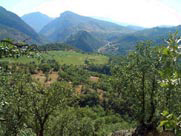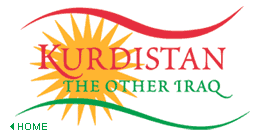A Kurdish Vision of Iraq
By Massoud Barzani, President, Kurdistan Region in Iraq
Washignton Post, Wednesday, October 26, 2005
In recent weeks Iraq has passed three important milestones. The constitutional referendum on Oct. 15 was a powerful demonstration of Iraqis' desire to establish democracy and save a country still recovering from its disastrous history. Two days later the remains of 500 of my kinsmen were returned from a mass grave in southern Iraq for reburial in Iraqi Kurdistan. Another 7,500 of my kin are still missing after "disappearing" from a Baathist concentration camp in 1983 in the first phase of the genocidal Anfal campaign, which caused the death of 182,000 Kurdish civilians during the 1980s. Then, on Oct. 19, Saddam Hussein finally went on trial.
None of this would have been possible without the U.S.-led liberation of Iraq, an operation in which Kurds were proud partners. After the U.S. armed forces, our peshmerga was the second-largest member of the coalition. Today the security forces of Iraqi Kurdistan remain highly capable and reliable allies of the United States. By consistently working with the United States and reaching out to our fellow Iraqis, we have been at the heart of a political process based on equality and inclusion, on consensus and compromise.
Above all, we have taken the path of engagement because, like the United States, we need Iraq to succeed and avoid a repetition of the horrors of the past. We have therefore been engaged in Iraqi national politics and governance. Kurds have joined the new Iraqi military in large numbers. We have made unprecedented sacrifices. Time and again we have pursued political settlements by encouraging flexibility and consensus.
And yet the Kurds have been vilified as separatists and derided for "overreaching." This stems from a belief that our aim is independence, and from the chauvinism that defines the Middle East as homogenous, that refuses to accepts its inherent diversity. What those who carp at the victims in Iraq fail to understand is that Kurds, like other Iraqis, crave security -- security for the future and security from the terrors of the past. We suffered more than 80 years of discrimination and disadvantage -- suffering that culminated in anti-Kurdish ethnic cleansing and genocide.
Unlike our critics, Kurds are pragmatists and moderates. We know that we have rights, but we also understand that we have responsibilities. We are patriots, not suicidal nationalists. That moderation has translated into a commitment to dialogue. We were pivotal in the establishment of the Iraqi Governing Council in July 2003 without any preconditions. We were under no obligation to reattach Kurdistan to Iraq. After all, the United States is not asking Kosovo to rejoin Serbia.
Our desire for security and our principles of moderation and dialogue were key factors in the proposal of all the major Iraqi political parties to create a federal, pluralistic and democratic Iraq in which power is decentralized and so less open to abuse. Iraqis of all communities recognize that only such a formula can keep Iraq intact.
In Iraqi Kurdistan we have, for the past 14 years, accepted the idea that we are a diverse society. Ethnic and religious minorities -- Assyrian and Chaldean Christians, Yazidis and Turkomans -- all serve in the Kurdistan regional government and all have the right to educate their children in their mother tongues and to broadcast in their own languages. We firmly believe that the Middle East must accommodate all of its peoples and all of their languages and religions. Nor is Kurdistan alone in this regard. In the new Iraq, the Kurds see their role as bridge builders, as a community that has every interest in an inclusive political process that gives Iraq a better future while addressing the injustices of the past.
Just as Kurds have not taken revenge on the Arab settlers who took over their land, so the moderate Sunni Arabs and Shiite Arabs of Iraq have shown similar forbearance in the face of a wave of suicide bombings that has claimed many thousands of lives. All democratic Iraqis have shown they realize that the wrongs of the past can be redressed only through agreed-on legal mechanisms and that justice cannot be selective. It is as important for Kurds to be allowed to return to Kirkuk and for Marsh Arabs to be restored to their homes as it is for Saddam Hussein to be put on trial.
The restraint of the victims, the defiance of the millions who vote -- refusing to be drawn into the civil war fantasies of the terrorists -- vindicate the courage and vision of the United States and its coalition partners. Backing this fundamentally sound vision has been President Bush's moral understanding of the healing and dignity that democracy confers upon all men and women, an understanding that the Kurds share.
The United States has never wavered in its quest to help Iraqis build a democracy that rewards compromise and consensus. The ever-generous American people have paid a tragic price, the lives of their finest men and women, to advance the banner of freedom and democracy, a sacrifice for which we are profoundly grateful. We all know that democracy is the only solution to political problems, the only method by which grievances can be addressed. In this war and for these principles, the Kurds are true friends of the United States.
The writer is president of the Kurdistan region of Iraq.
Source: Washington Post
Click here for press enquiries. |
Quote
|
  Our desire for security and our principles of moderation and dialogue were key factors in the proposal of all the major Iraqi political parties to create a federal, pluralistic and democratic Iraq in which power is decentralized and so less open to abuse. Iraqis of all communities recognize that only such a formula can keep Iraq intact. Our desire for security and our principles of moderation and dialogue were key factors in the proposal of all the major Iraqi political parties to create a federal, pluralistic and democratic Iraq in which power is decentralized and so less open to abuse. Iraqis of all communities recognize that only such a formula can keep Iraq intact.
Masoud Barzani, President
Kurdistan Region in Iraq
|
|


